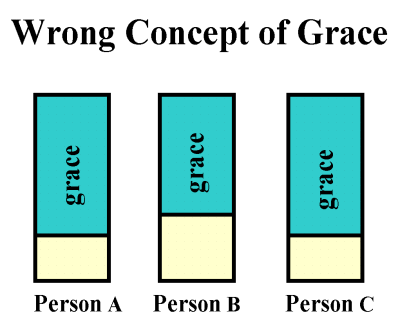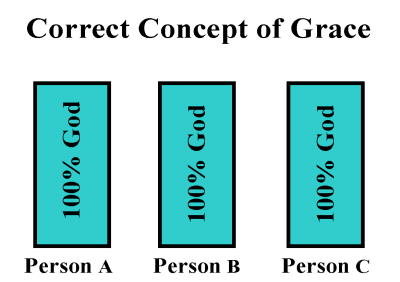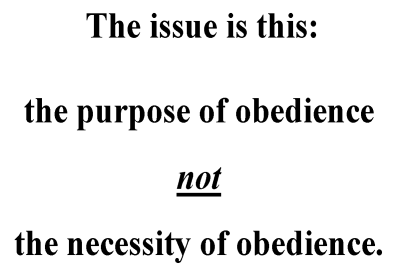PERVERTING TRUST
Most people who regard themselves to be Christian, including most if not all of
us, agree the foundation of Christianity is trust. Faith is a cornerstone of Christianity.
In practical terms that we understand, faith is trust. One of Christianity's basic
objectives in a Christian's life is developing trust. Increasing our willingness to trust is
the constant goal of faith.
I sincerely doubt that the greater majority of Christians (a) discount the
importance of faith or (b) disagree that the goal of faith is to increase a believer's
willingness to trust. There is broad agreement on the importance, the necessity of
having faith or trust.
The common disagreement comes when people (who regard themselves to be
Christians) define what we are to trust. There is broad agreement that believers must
trust. There is also broad disagreement about what should be the object or focus of
that trust. Consider a few things that are commonly presented as the foundation object
or focus of a believer's trust.
a doctrinal position
a set of doctrinal positions
[Both are often referred to as "the faith."]
a tradition
a set of traditional practices
[The person who keeps the traditions is often referred to as "faithful."]
the church
[One devoted to the church is often referred to as someone who "keeps the faith."]
Last Sunday evening I asked you to think about the trust that God values. We
noted the incident in Abraham's life in Genesis 15 when he trusted God's promise, and
God reckoned his trust as righteousness. (Genesis 15:6)
This evening I ask you to focus on another incident in Abraham's life, his
willingness to kill his son Isaac as a burnt offering to God (Genesis 22:1-19).
- The situation:
- Isaac, the son God promised Abraham, is now a "lad."
- Scripture does not say how old Isaac was at this time.
- The evidence indicates he was much older than a toddler.
- He walked, talked, and was able to have an insightful conversation with
his father.
- He was physically capable of going on a three day trip with his father.
- He knew and understood the basic necessities for a sacrifice of burnt
offering to God.
- He was able to carry the wood to be used in the sacrifice up a mountain.
- Abraham waited twenty-five years for Isaac's birth.
- Abraham is now over one hundred years old.
- The impossible became fact for him and Sarah.
- It happened because God kept His promise.
The request astounds us; I wonder how it affected Abraham.
- The incident began very simply.
- Genesis 22:1 simply notes that God "tested" Abraham.
- Not "tempted," but "tested"
- Satan uses temptation in the desire to destroy us.
- God tests us in the desire to advance our spiritual growth.
- It began with a simple call, "Abraham!" and a simple answer, "Here I am!"
- God's request was direct, to the point, and simple: "Take Isaac and offer
him as burnt sacrifice on Mount Moriah."
- I long have been astounded with the promptness and preparation of
Abraham's response.
- I have no doubt that Abraham loved Isaac dearly.
- I have no doubt that Abraham felt a great sense of peace and hope when
he looked at his son and thought about God, the blessing, and
possibilities that existed because God kept His promise.
- Now God asked Abraham to do something that defied Abraham's past
experiences with God and God's promises to Abraham.
- Abraham:
- Arose early the next morning.
- Prepared his donkey for travel.
- Took young men to assist him.
- Prepared the wood for the sacrifice.
- Abraham did nothing to prolong the life or delay the death of Isaac.
- The servants had no idea of what was to happen, and Abraham made
certain they did not interfere with his offering.
- I have long been impressed at how difficult those three days of travel must
have been.
- He spent each of those days with his son certain he was taking his son to
his death.
- He spent each of those days with his son knowing that he would kill him.
- I have long been impressed with Abraham's answer to Isaac's question.
- Isaac: "Where is the lamb for the sacrifice?"
- Abraham: "God will provide for Himself the lamb for the sacrifice."
Abraham would have killed Isaac in sacrifice to God had an angel not
stopped him in the act.
- Do you want to understand the nature of the trust that God reckons to be
righteousness?
- "Now I know that you fear (reverence) God, since you have not withheld your
son, your only son, from Me." (Genesis 22:12)
What was this "testing" all about? Why put Abraham and Isaac through all
that agony?
- I call your attention to the central issue within the incident.
- This was the question to be answered.
- Does Abraham place his trust in the gift (the son) God gave?
- Or, does Abraham place his trust in the God who gave the gift?
God was very specific about the great promises He made to Abraham.
- Abraham would have descendants through whom God would bring a blessing
to all families of the earth. (Genesis 12:1-4)
- Those descendants would be so numerous they could not be counted.
(Genesis 15:5)
- This would all happen because Abraham and Sarah would have a son.
(Genesis 17:15, 16)
Did Abraham believe those promises would happen because Isaac existed,
or did Abraham believe those promises would happen because God
existed?
- Was his confidence in God until Isaac was born, and at Isaac's birth he
transferred his confidence in the fact he had a son?
- Or, did he keep is confidence in the God who made the promise even after
Isaac was born?
- In the willingness to offer Isaac, Abraham emphatically declared, "My trust is
in the God who gave me Isaac."
- "Abraham, is Isaac the son God promised you?" "Yes."
- "You clearly understand that Isaac is the son of promise?" "Yes."
- "If you kill Isaac, how will God keep His promise?" "I do not know how
God will do it, but if He promised it would happen, it will happen."
- Many hundred years later, Hebrews 11:19 stated Abraham was confident
that God was able to resurrect people from the dead.
- Abraham made it quite clear that 100% of his confidence was in God, and 0%
of his confidence was in himself or anything he did.
- What did God owe Abraham? Nothing.
- What did Abraham think God owed him? Nothing.
- Abraham learned much before this incident that God could do what God
promised because He was God.
- The God that gave a hundred year old man and his ninety year old wife
their first child could do and would do anything necessary to keep His
promise.
Let me illustrate the total adequacy of God and the total inadequacy of a
person.
- My point: the production of salvation in my life is all God.
- Divine forgiveness is 100% God and 0% David.
- Divine mercy is 100% God and 0% David.
- Divine grace is 100% God and 0% David.
First, I use the incorrect concept I used years ago.

- When I first began focusing on God's grace, I illustrated grace in this way.
- The person does all he can do, which is never nearly enough.
- Then God makes a person acceptable by adding grace to make the person
complete.
Second, I use what I now understand to be the correct concept.

- The New Testament concept of grace is that God provides 100% because
even the best of us can provide nothing.
- The person obediently serves God, but the person places zero confidence in
anything he or she does.
- I can stand before God because of what God does for me in Christ, not
because of anything I do for God.
The central question is not about the necessity of obedience but about the
purpose of obedience.

- Is obedience absolutely necessary? Yes!
- Does my obedience earn anything or in any way obligate God to me? No!
- I obey because I trust.
- I obey to express my love and appreciation for all that God does for me in
Christ.
One of the serious, destructive crises we face as Christians today is found in this
fact: too many trust the gifts God gave instead of the God who gave the gifts.
We need the kind of trust in God that made Abraham willing to offer Isaac.
We need the kind of trust in God that allowed Job to remain with God after he
lost everything.
We need the kind of trust in God the led David to face Goliath.
We need the kind of trust in God that motivated Daniel to be loyal to God even in
the land of captivity.
We need the kind of trust in God that overwhelms us when we consider God's
mercy and forgiveness, just as Paul was overwhelmed.
We need the kind of trust in God that never forgets God owes us nothing, but we
owe God everything.
David Chadwell
West-Ark Church of Christ, Fort Smith, AR
Evening Sermon, 17 March 2002
 Link to next sermon
Link to next sermon
 Link to other Writings of David Chadwell
Link to other Writings of David Chadwell




![]() Link to next sermon
Link to next sermon
![]() Link to other Writings of David Chadwell
Link to other Writings of David Chadwell